Organisational Behaviour: Culture, Power, Politics, Motivation, and Effective Teams
VerifiedAdded on 2022/11/30
|17
|5023
|109
AI Summary
This document explores the influence of organisational culture, power, politics, and motivation on individual and team behaviour and performance. It discusses the different theories of motivation and their application in achieving organisational goals. It also examines the characteristics of effective teams and their importance in accomplishing organisational objectives. The document focuses on the subject of Organisational Behaviour and is relevant for students studying this course in any college or university.
Contribute Materials
Your contribution can guide someone’s learning journey. Share your
documents today.
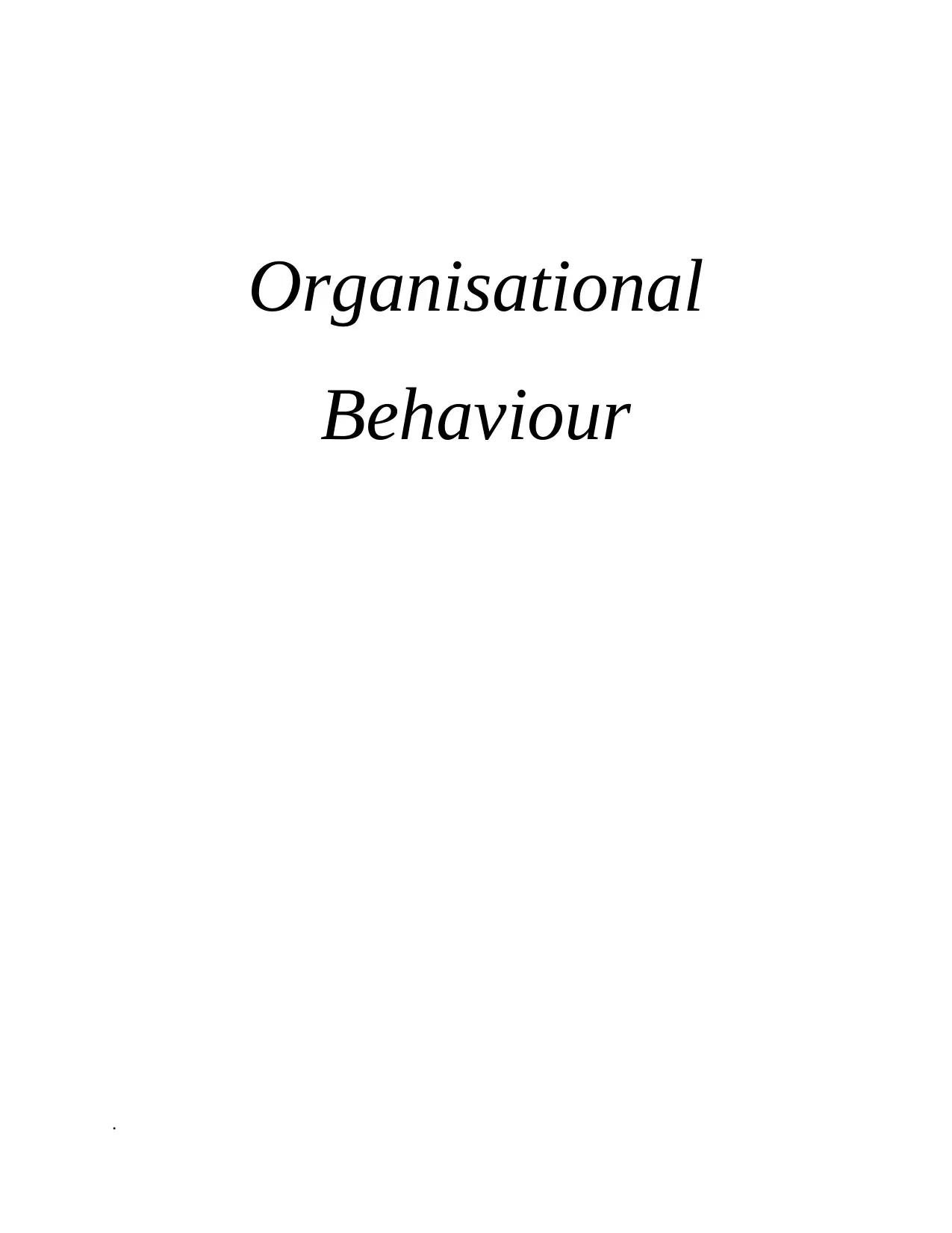
Organisational
Behaviour
.
Behaviour
.
Secure Best Marks with AI Grader
Need help grading? Try our AI Grader for instant feedback on your assignments.
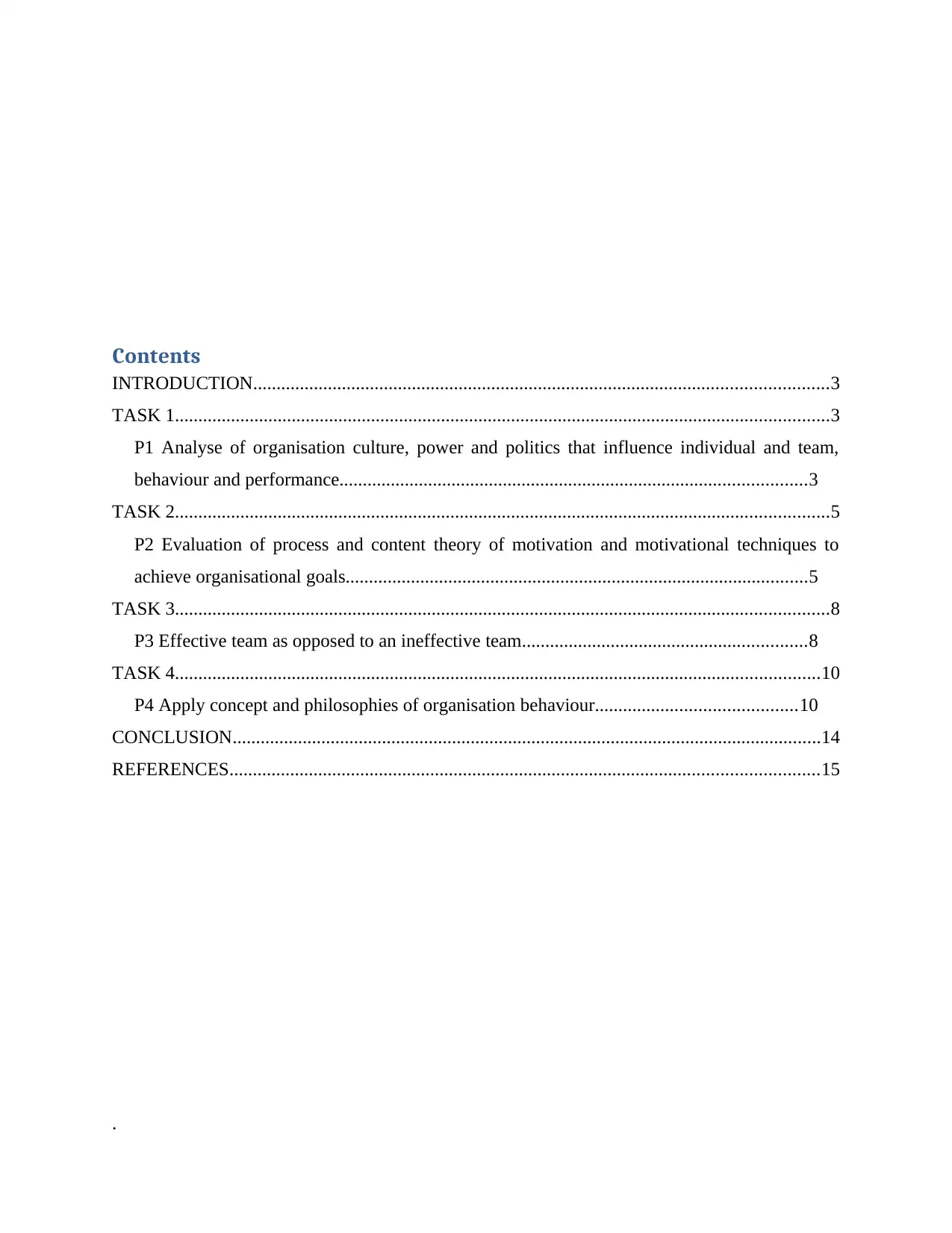
Contents
INTRODUCTION...........................................................................................................................3
TASK 1............................................................................................................................................3
P1 Analyse of organisation culture, power and politics that influence individual and team,
behaviour and performance....................................................................................................3
TASK 2............................................................................................................................................5
P2 Evaluation of process and content theory of motivation and motivational techniques to
achieve organisational goals...................................................................................................5
TASK 3............................................................................................................................................8
P3 Effective team as opposed to an ineffective team.............................................................8
TASK 4..........................................................................................................................................10
P4 Apply concept and philosophies of organisation behaviour...........................................10
CONCLUSION..............................................................................................................................14
REFERENCES..............................................................................................................................15
.
INTRODUCTION...........................................................................................................................3
TASK 1............................................................................................................................................3
P1 Analyse of organisation culture, power and politics that influence individual and team,
behaviour and performance....................................................................................................3
TASK 2............................................................................................................................................5
P2 Evaluation of process and content theory of motivation and motivational techniques to
achieve organisational goals...................................................................................................5
TASK 3............................................................................................................................................8
P3 Effective team as opposed to an ineffective team.............................................................8
TASK 4..........................................................................................................................................10
P4 Apply concept and philosophies of organisation behaviour...........................................10
CONCLUSION..............................................................................................................................14
REFERENCES..............................................................................................................................15
.
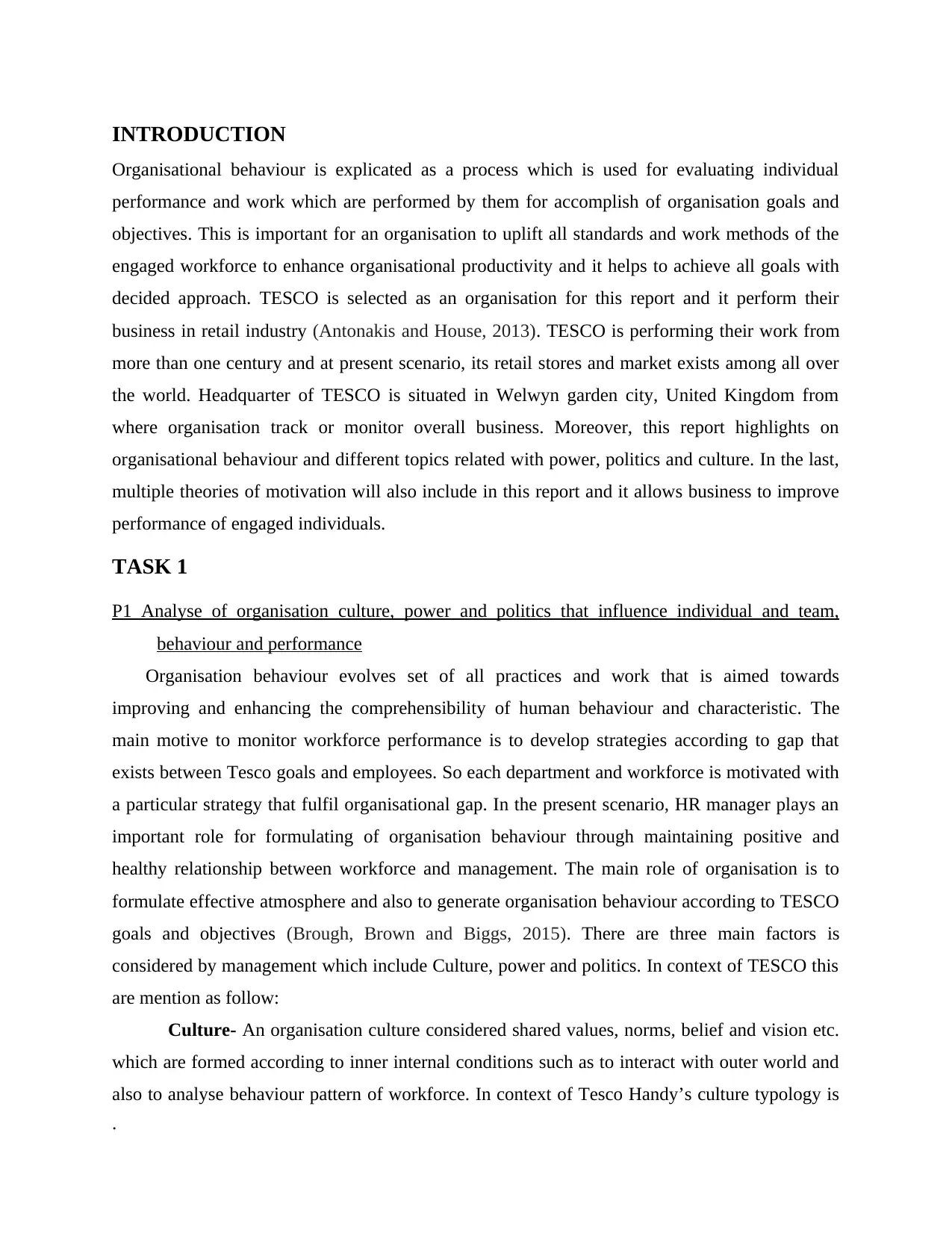
INTRODUCTION
Organisational behaviour is explicated as a process which is used for evaluating individual
performance and work which are performed by them for accomplish of organisation goals and
objectives. This is important for an organisation to uplift all standards and work methods of the
engaged workforce to enhance organisational productivity and it helps to achieve all goals with
decided approach. TESCO is selected as an organisation for this report and it perform their
business in retail industry (Antonakis and House, 2013). TESCO is performing their work from
more than one century and at present scenario, its retail stores and market exists among all over
the world. Headquarter of TESCO is situated in Welwyn garden city, United Kingdom from
where organisation track or monitor overall business. Moreover, this report highlights on
organisational behaviour and different topics related with power, politics and culture. In the last,
multiple theories of motivation will also include in this report and it allows business to improve
performance of engaged individuals.
TASK 1
P1 Analyse of organisation culture, power and politics that influence individual and team,
behaviour and performance
Organisation behaviour evolves set of all practices and work that is aimed towards
improving and enhancing the comprehensibility of human behaviour and characteristic. The
main motive to monitor workforce performance is to develop strategies according to gap that
exists between Tesco goals and employees. So each department and workforce is motivated with
a particular strategy that fulfil organisational gap. In the present scenario, HR manager plays an
important role for formulating of organisation behaviour through maintaining positive and
healthy relationship between workforce and management. The main role of organisation is to
formulate effective atmosphere and also to generate organisation behaviour according to TESCO
goals and objectives (Brough, Brown and Biggs, 2015). There are three main factors is
considered by management which include Culture, power and politics. In context of TESCO this
are mention as follow:
Culture- An organisation culture considered shared values, norms, belief and vision etc.
which are formed according to inner internal conditions such as to interact with outer world and
also to analyse behaviour pattern of workforce. In context of Tesco Handy’s culture typology is
.
Organisational behaviour is explicated as a process which is used for evaluating individual
performance and work which are performed by them for accomplish of organisation goals and
objectives. This is important for an organisation to uplift all standards and work methods of the
engaged workforce to enhance organisational productivity and it helps to achieve all goals with
decided approach. TESCO is selected as an organisation for this report and it perform their
business in retail industry (Antonakis and House, 2013). TESCO is performing their work from
more than one century and at present scenario, its retail stores and market exists among all over
the world. Headquarter of TESCO is situated in Welwyn garden city, United Kingdom from
where organisation track or monitor overall business. Moreover, this report highlights on
organisational behaviour and different topics related with power, politics and culture. In the last,
multiple theories of motivation will also include in this report and it allows business to improve
performance of engaged individuals.
TASK 1
P1 Analyse of organisation culture, power and politics that influence individual and team,
behaviour and performance
Organisation behaviour evolves set of all practices and work that is aimed towards
improving and enhancing the comprehensibility of human behaviour and characteristic. The
main motive to monitor workforce performance is to develop strategies according to gap that
exists between Tesco goals and employees. So each department and workforce is motivated with
a particular strategy that fulfil organisational gap. In the present scenario, HR manager plays an
important role for formulating of organisation behaviour through maintaining positive and
healthy relationship between workforce and management. The main role of organisation is to
formulate effective atmosphere and also to generate organisation behaviour according to TESCO
goals and objectives (Brough, Brown and Biggs, 2015). There are three main factors is
considered by management which include Culture, power and politics. In context of TESCO this
are mention as follow:
Culture- An organisation culture considered shared values, norms, belief and vision etc.
which are formed according to inner internal conditions such as to interact with outer world and
also to analyse behaviour pattern of workforce. In context of Tesco Handy’s culture typology is
.
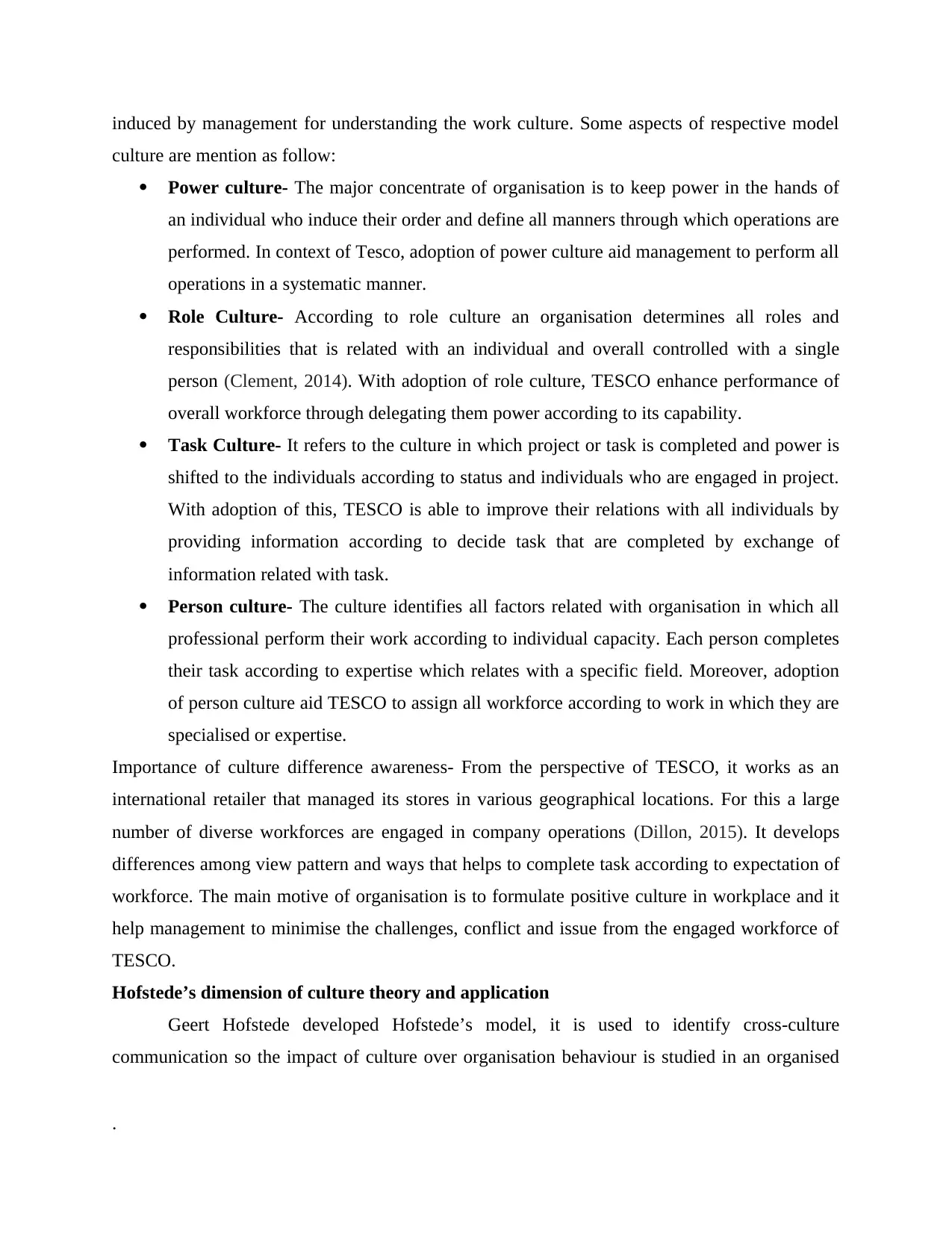
induced by management for understanding the work culture. Some aspects of respective model
culture are mention as follow:
Power culture- The major concentrate of organisation is to keep power in the hands of
an individual who induce their order and define all manners through which operations are
performed. In context of Tesco, adoption of power culture aid management to perform all
operations in a systematic manner.
Role Culture- According to role culture an organisation determines all roles and
responsibilities that is related with an individual and overall controlled with a single
person (Clement, 2014). With adoption of role culture, TESCO enhance performance of
overall workforce through delegating them power according to its capability.
Task Culture- It refers to the culture in which project or task is completed and power is
shifted to the individuals according to status and individuals who are engaged in project.
With adoption of this, TESCO is able to improve their relations with all individuals by
providing information according to decide task that are completed by exchange of
information related with task.
Person culture- The culture identifies all factors related with organisation in which all
professional perform their work according to individual capacity. Each person completes
their task according to expertise which relates with a specific field. Moreover, adoption
of person culture aid TESCO to assign all workforce according to work in which they are
specialised or expertise.
Importance of culture difference awareness- From the perspective of TESCO, it works as an
international retailer that managed its stores in various geographical locations. For this a large
number of diverse workforces are engaged in company operations (Dillon, 2015). It develops
differences among view pattern and ways that helps to complete task according to expectation of
workforce. The main motive of organisation is to formulate positive culture in workplace and it
help management to minimise the challenges, conflict and issue from the engaged workforce of
TESCO.
Hofstede’s dimension of culture theory and application
Geert Hofstede developed Hofstede’s model, it is used to identify cross-culture
communication so the impact of culture over organisation behaviour is studied in an organised
.
culture are mention as follow:
Power culture- The major concentrate of organisation is to keep power in the hands of
an individual who induce their order and define all manners through which operations are
performed. In context of Tesco, adoption of power culture aid management to perform all
operations in a systematic manner.
Role Culture- According to role culture an organisation determines all roles and
responsibilities that is related with an individual and overall controlled with a single
person (Clement, 2014). With adoption of role culture, TESCO enhance performance of
overall workforce through delegating them power according to its capability.
Task Culture- It refers to the culture in which project or task is completed and power is
shifted to the individuals according to status and individuals who are engaged in project.
With adoption of this, TESCO is able to improve their relations with all individuals by
providing information according to decide task that are completed by exchange of
information related with task.
Person culture- The culture identifies all factors related with organisation in which all
professional perform their work according to individual capacity. Each person completes
their task according to expertise which relates with a specific field. Moreover, adoption
of person culture aid TESCO to assign all workforce according to work in which they are
specialised or expertise.
Importance of culture difference awareness- From the perspective of TESCO, it works as an
international retailer that managed its stores in various geographical locations. For this a large
number of diverse workforces are engaged in company operations (Dillon, 2015). It develops
differences among view pattern and ways that helps to complete task according to expectation of
workforce. The main motive of organisation is to formulate positive culture in workplace and it
help management to minimise the challenges, conflict and issue from the engaged workforce of
TESCO.
Hofstede’s dimension of culture theory and application
Geert Hofstede developed Hofstede’s model, it is used to identify cross-culture
communication so the impact of culture over organisation behaviour is studied in an organised
.
Secure Best Marks with AI Grader
Need help grading? Try our AI Grader for instant feedback on your assignments.
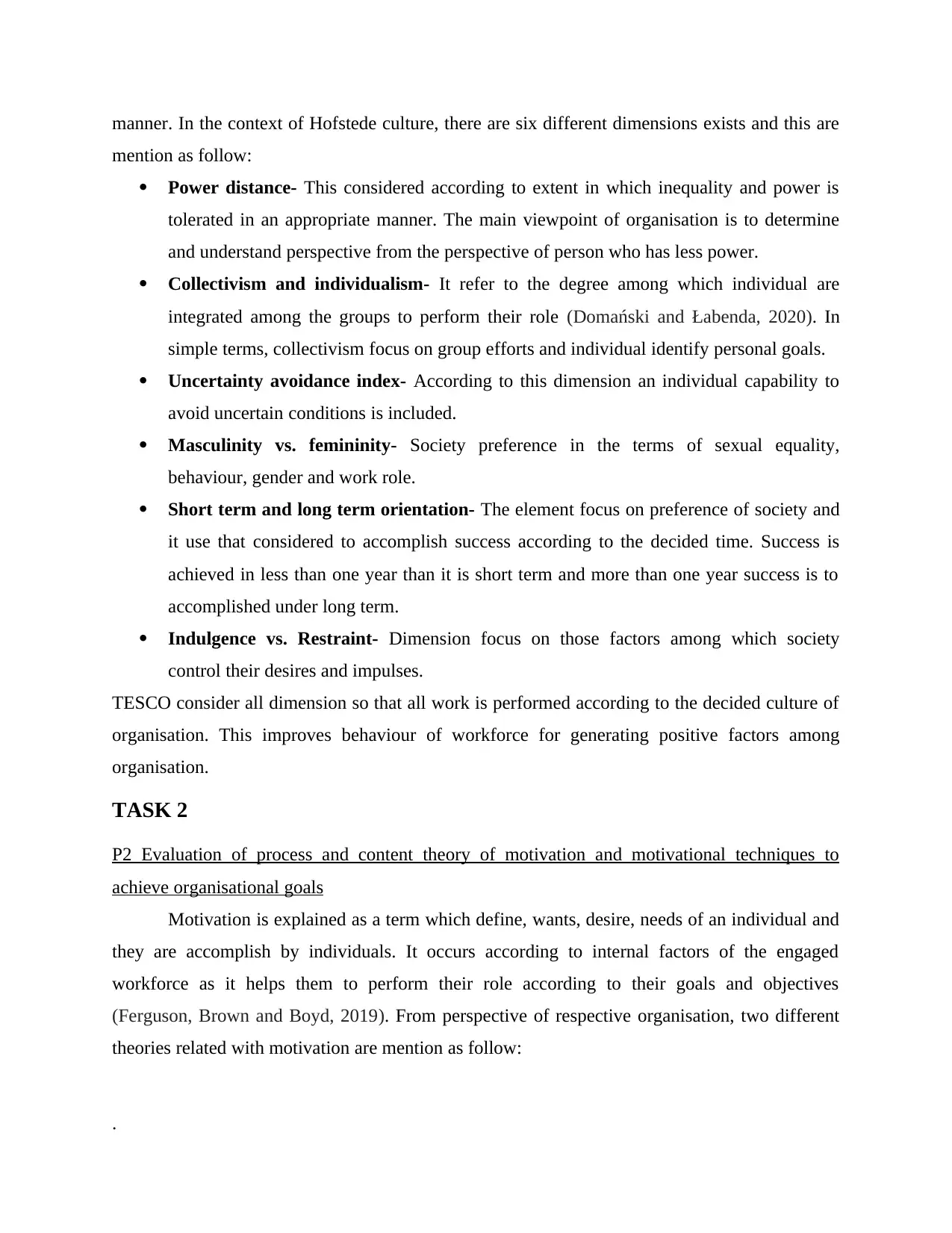
manner. In the context of Hofstede culture, there are six different dimensions exists and this are
mention as follow:
Power distance- This considered according to extent in which inequality and power is
tolerated in an appropriate manner. The main viewpoint of organisation is to determine
and understand perspective from the perspective of person who has less power.
Collectivism and individualism- It refer to the degree among which individual are
integrated among the groups to perform their role (Domański and Łabenda, 2020). In
simple terms, collectivism focus on group efforts and individual identify personal goals.
Uncertainty avoidance index- According to this dimension an individual capability to
avoid uncertain conditions is included.
Masculinity vs. femininity- Society preference in the terms of sexual equality,
behaviour, gender and work role.
Short term and long term orientation- The element focus on preference of society and
it use that considered to accomplish success according to the decided time. Success is
achieved in less than one year than it is short term and more than one year success is to
accomplished under long term.
Indulgence vs. Restraint- Dimension focus on those factors among which society
control their desires and impulses.
TESCO consider all dimension so that all work is performed according to the decided culture of
organisation. This improves behaviour of workforce for generating positive factors among
organisation.
TASK 2
P2 Evaluation of process and content theory of motivation and motivational techniques to
achieve organisational goals
Motivation is explained as a term which define, wants, desire, needs of an individual and
they are accomplish by individuals. It occurs according to internal factors of the engaged
workforce as it helps them to perform their role according to their goals and objectives
(Ferguson, Brown and Boyd, 2019). From perspective of respective organisation, two different
theories related with motivation are mention as follow:
.
mention as follow:
Power distance- This considered according to extent in which inequality and power is
tolerated in an appropriate manner. The main viewpoint of organisation is to determine
and understand perspective from the perspective of person who has less power.
Collectivism and individualism- It refer to the degree among which individual are
integrated among the groups to perform their role (Domański and Łabenda, 2020). In
simple terms, collectivism focus on group efforts and individual identify personal goals.
Uncertainty avoidance index- According to this dimension an individual capability to
avoid uncertain conditions is included.
Masculinity vs. femininity- Society preference in the terms of sexual equality,
behaviour, gender and work role.
Short term and long term orientation- The element focus on preference of society and
it use that considered to accomplish success according to the decided time. Success is
achieved in less than one year than it is short term and more than one year success is to
accomplished under long term.
Indulgence vs. Restraint- Dimension focus on those factors among which society
control their desires and impulses.
TESCO consider all dimension so that all work is performed according to the decided culture of
organisation. This improves behaviour of workforce for generating positive factors among
organisation.
TASK 2
P2 Evaluation of process and content theory of motivation and motivational techniques to
achieve organisational goals
Motivation is explained as a term which define, wants, desire, needs of an individual and
they are accomplish by individuals. It occurs according to internal factors of the engaged
workforce as it helps them to perform their role according to their goals and objectives
(Ferguson, Brown and Boyd, 2019). From perspective of respective organisation, two different
theories related with motivation are mention as follow:
.
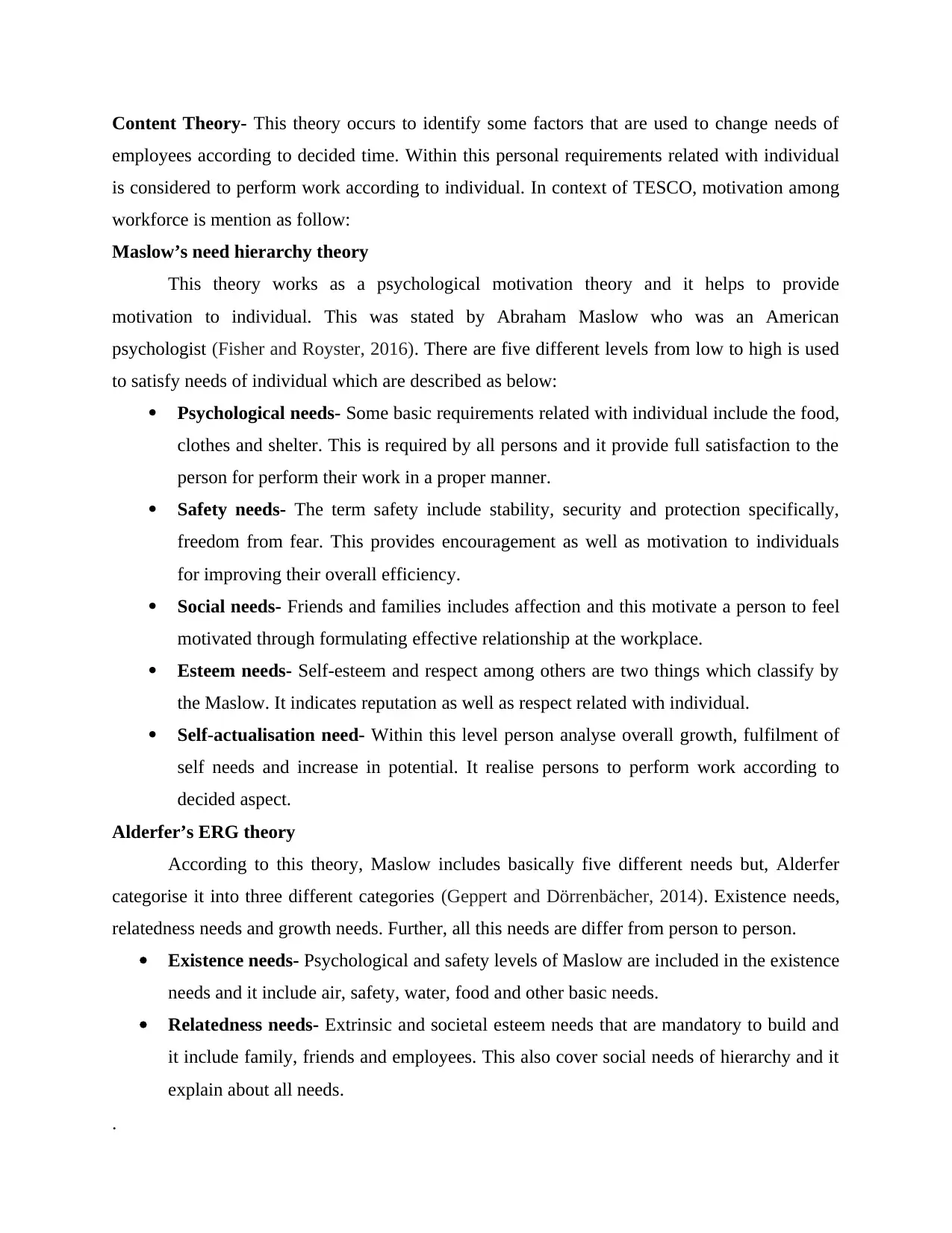
Content Theory- This theory occurs to identify some factors that are used to change needs of
employees according to decided time. Within this personal requirements related with individual
is considered to perform work according to individual. In context of TESCO, motivation among
workforce is mention as follow:
Maslow’s need hierarchy theory
This theory works as a psychological motivation theory and it helps to provide
motivation to individual. This was stated by Abraham Maslow who was an American
psychologist (Fisher and Royster, 2016). There are five different levels from low to high is used
to satisfy needs of individual which are described as below:
Psychological needs- Some basic requirements related with individual include the food,
clothes and shelter. This is required by all persons and it provide full satisfaction to the
person for perform their work in a proper manner.
Safety needs- The term safety include stability, security and protection specifically,
freedom from fear. This provides encouragement as well as motivation to individuals
for improving their overall efficiency.
Social needs- Friends and families includes affection and this motivate a person to feel
motivated through formulating effective relationship at the workplace.
Esteem needs- Self-esteem and respect among others are two things which classify by
the Maslow. It indicates reputation as well as respect related with individual.
Self-actualisation need- Within this level person analyse overall growth, fulfilment of
self needs and increase in potential. It realise persons to perform work according to
decided aspect.
Alderfer’s ERG theory
According to this theory, Maslow includes basically five different needs but, Alderfer
categorise it into three different categories (Geppert and Dörrenbächer, 2014). Existence needs,
relatedness needs and growth needs. Further, all this needs are differ from person to person.
Existence needs- Psychological and safety levels of Maslow are included in the existence
needs and it include air, safety, water, food and other basic needs.
Relatedness needs- Extrinsic and societal esteem needs that are mandatory to build and
it include family, friends and employees. This also cover social needs of hierarchy and it
explain about all needs.
.
employees according to decided time. Within this personal requirements related with individual
is considered to perform work according to individual. In context of TESCO, motivation among
workforce is mention as follow:
Maslow’s need hierarchy theory
This theory works as a psychological motivation theory and it helps to provide
motivation to individual. This was stated by Abraham Maslow who was an American
psychologist (Fisher and Royster, 2016). There are five different levels from low to high is used
to satisfy needs of individual which are described as below:
Psychological needs- Some basic requirements related with individual include the food,
clothes and shelter. This is required by all persons and it provide full satisfaction to the
person for perform their work in a proper manner.
Safety needs- The term safety include stability, security and protection specifically,
freedom from fear. This provides encouragement as well as motivation to individuals
for improving their overall efficiency.
Social needs- Friends and families includes affection and this motivate a person to feel
motivated through formulating effective relationship at the workplace.
Esteem needs- Self-esteem and respect among others are two things which classify by
the Maslow. It indicates reputation as well as respect related with individual.
Self-actualisation need- Within this level person analyse overall growth, fulfilment of
self needs and increase in potential. It realise persons to perform work according to
decided aspect.
Alderfer’s ERG theory
According to this theory, Maslow includes basically five different needs but, Alderfer
categorise it into three different categories (Geppert and Dörrenbächer, 2014). Existence needs,
relatedness needs and growth needs. Further, all this needs are differ from person to person.
Existence needs- Psychological and safety levels of Maslow are included in the existence
needs and it include air, safety, water, food and other basic needs.
Relatedness needs- Extrinsic and societal esteem needs that are mandatory to build and
it include family, friends and employees. This also cover social needs of hierarchy and it
explain about all needs.
.
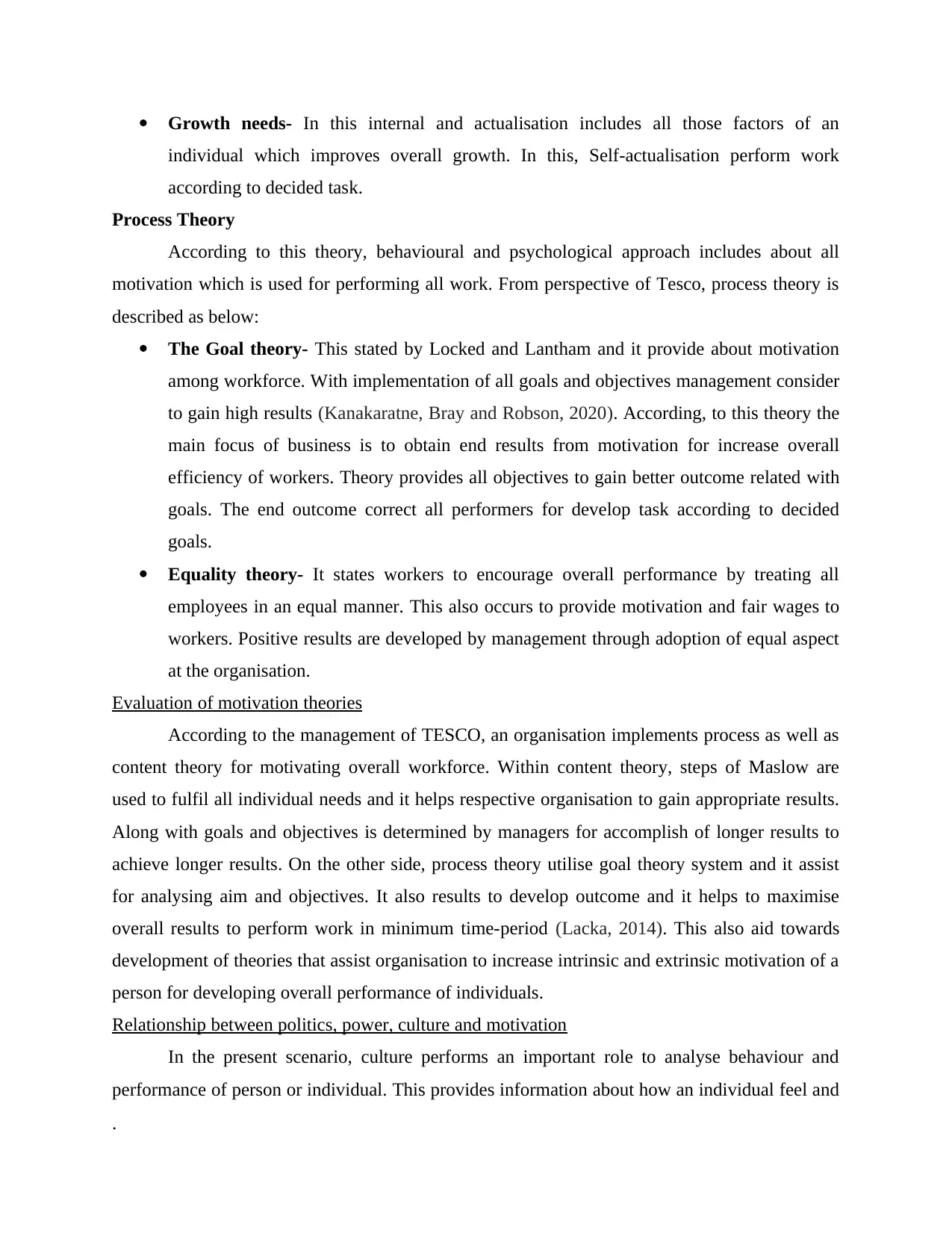
Growth needs- In this internal and actualisation includes all those factors of an
individual which improves overall growth. In this, Self-actualisation perform work
according to decided task.
Process Theory
According to this theory, behavioural and psychological approach includes about all
motivation which is used for performing all work. From perspective of Tesco, process theory is
described as below:
The Goal theory- This stated by Locked and Lantham and it provide about motivation
among workforce. With implementation of all goals and objectives management consider
to gain high results (Kanakaratne, Bray and Robson, 2020). According, to this theory the
main focus of business is to obtain end results from motivation for increase overall
efficiency of workers. Theory provides all objectives to gain better outcome related with
goals. The end outcome correct all performers for develop task according to decided
goals.
Equality theory- It states workers to encourage overall performance by treating all
employees in an equal manner. This also occurs to provide motivation and fair wages to
workers. Positive results are developed by management through adoption of equal aspect
at the organisation.
Evaluation of motivation theories
According to the management of TESCO, an organisation implements process as well as
content theory for motivating overall workforce. Within content theory, steps of Maslow are
used to fulfil all individual needs and it helps respective organisation to gain appropriate results.
Along with goals and objectives is determined by managers for accomplish of longer results to
achieve longer results. On the other side, process theory utilise goal theory system and it assist
for analysing aim and objectives. It also results to develop outcome and it helps to maximise
overall results to perform work in minimum time-period (Lacka, 2014). This also aid towards
development of theories that assist organisation to increase intrinsic and extrinsic motivation of a
person for developing overall performance of individuals.
Relationship between politics, power, culture and motivation
In the present scenario, culture performs an important role to analyse behaviour and
performance of person or individual. This provides information about how an individual feel and
.
individual which improves overall growth. In this, Self-actualisation perform work
according to decided task.
Process Theory
According to this theory, behavioural and psychological approach includes about all
motivation which is used for performing all work. From perspective of Tesco, process theory is
described as below:
The Goal theory- This stated by Locked and Lantham and it provide about motivation
among workforce. With implementation of all goals and objectives management consider
to gain high results (Kanakaratne, Bray and Robson, 2020). According, to this theory the
main focus of business is to obtain end results from motivation for increase overall
efficiency of workers. Theory provides all objectives to gain better outcome related with
goals. The end outcome correct all performers for develop task according to decided
goals.
Equality theory- It states workers to encourage overall performance by treating all
employees in an equal manner. This also occurs to provide motivation and fair wages to
workers. Positive results are developed by management through adoption of equal aspect
at the organisation.
Evaluation of motivation theories
According to the management of TESCO, an organisation implements process as well as
content theory for motivating overall workforce. Within content theory, steps of Maslow are
used to fulfil all individual needs and it helps respective organisation to gain appropriate results.
Along with goals and objectives is determined by managers for accomplish of longer results to
achieve longer results. On the other side, process theory utilise goal theory system and it assist
for analysing aim and objectives. It also results to develop outcome and it helps to maximise
overall results to perform work in minimum time-period (Lacka, 2014). This also aid towards
development of theories that assist organisation to increase intrinsic and extrinsic motivation of a
person for developing overall performance of individuals.
Relationship between politics, power, culture and motivation
In the present scenario, culture performs an important role to analyse behaviour and
performance of person or individual. This provides information about how an individual feel and
.
Paraphrase This Document
Need a fresh take? Get an instant paraphrase of this document with our AI Paraphraser
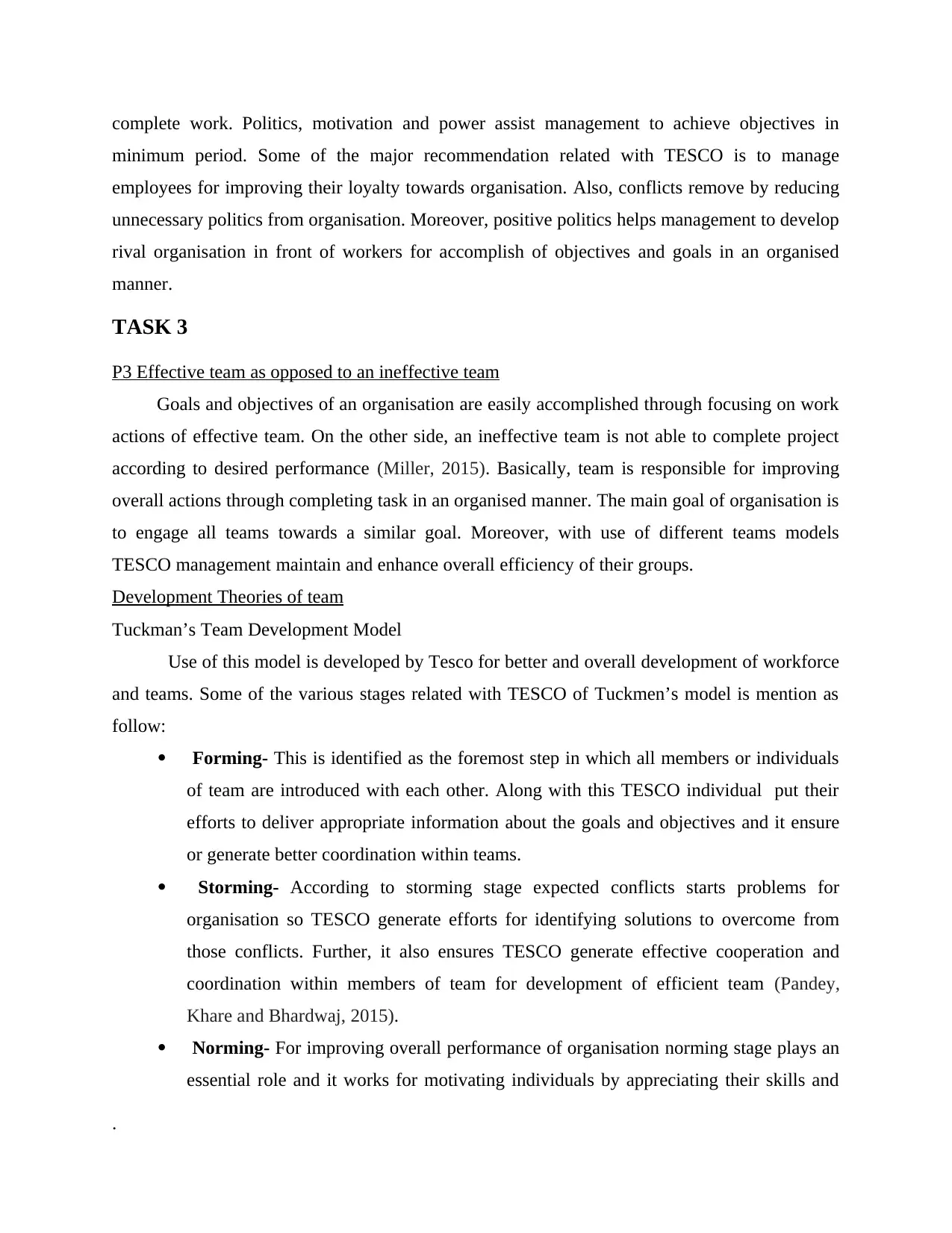
complete work. Politics, motivation and power assist management to achieve objectives in
minimum period. Some of the major recommendation related with TESCO is to manage
employees for improving their loyalty towards organisation. Also, conflicts remove by reducing
unnecessary politics from organisation. Moreover, positive politics helps management to develop
rival organisation in front of workers for accomplish of objectives and goals in an organised
manner.
TASK 3
P3 Effective team as opposed to an ineffective team
Goals and objectives of an organisation are easily accomplished through focusing on work
actions of effective team. On the other side, an ineffective team is not able to complete project
according to desired performance (Miller, 2015). Basically, team is responsible for improving
overall actions through completing task in an organised manner. The main goal of organisation is
to engage all teams towards a similar goal. Moreover, with use of different teams models
TESCO management maintain and enhance overall efficiency of their groups.
Development Theories of team
Tuckman’s Team Development Model
Use of this model is developed by Tesco for better and overall development of workforce
and teams. Some of the various stages related with TESCO of Tuckmen’s model is mention as
follow:
Forming- This is identified as the foremost step in which all members or individuals
of team are introduced with each other. Along with this TESCO individual put their
efforts to deliver appropriate information about the goals and objectives and it ensure
or generate better coordination within teams.
Storming- According to storming stage expected conflicts starts problems for
organisation so TESCO generate efforts for identifying solutions to overcome from
those conflicts. Further, it also ensures TESCO generate effective cooperation and
coordination within members of team for development of efficient team (Pandey,
Khare and Bhardwaj, 2015).
Norming- For improving overall performance of organisation norming stage plays an
essential role and it works for motivating individuals by appreciating their skills and
.
minimum period. Some of the major recommendation related with TESCO is to manage
employees for improving their loyalty towards organisation. Also, conflicts remove by reducing
unnecessary politics from organisation. Moreover, positive politics helps management to develop
rival organisation in front of workers for accomplish of objectives and goals in an organised
manner.
TASK 3
P3 Effective team as opposed to an ineffective team
Goals and objectives of an organisation are easily accomplished through focusing on work
actions of effective team. On the other side, an ineffective team is not able to complete project
according to desired performance (Miller, 2015). Basically, team is responsible for improving
overall actions through completing task in an organised manner. The main goal of organisation is
to engage all teams towards a similar goal. Moreover, with use of different teams models
TESCO management maintain and enhance overall efficiency of their groups.
Development Theories of team
Tuckman’s Team Development Model
Use of this model is developed by Tesco for better and overall development of workforce
and teams. Some of the various stages related with TESCO of Tuckmen’s model is mention as
follow:
Forming- This is identified as the foremost step in which all members or individuals
of team are introduced with each other. Along with this TESCO individual put their
efforts to deliver appropriate information about the goals and objectives and it ensure
or generate better coordination within teams.
Storming- According to storming stage expected conflicts starts problems for
organisation so TESCO generate efforts for identifying solutions to overcome from
those conflicts. Further, it also ensures TESCO generate effective cooperation and
coordination within members of team for development of efficient team (Pandey,
Khare and Bhardwaj, 2015).
Norming- For improving overall performance of organisation norming stage plays an
essential role and it works for motivating individuals by appreciating their skills and
.
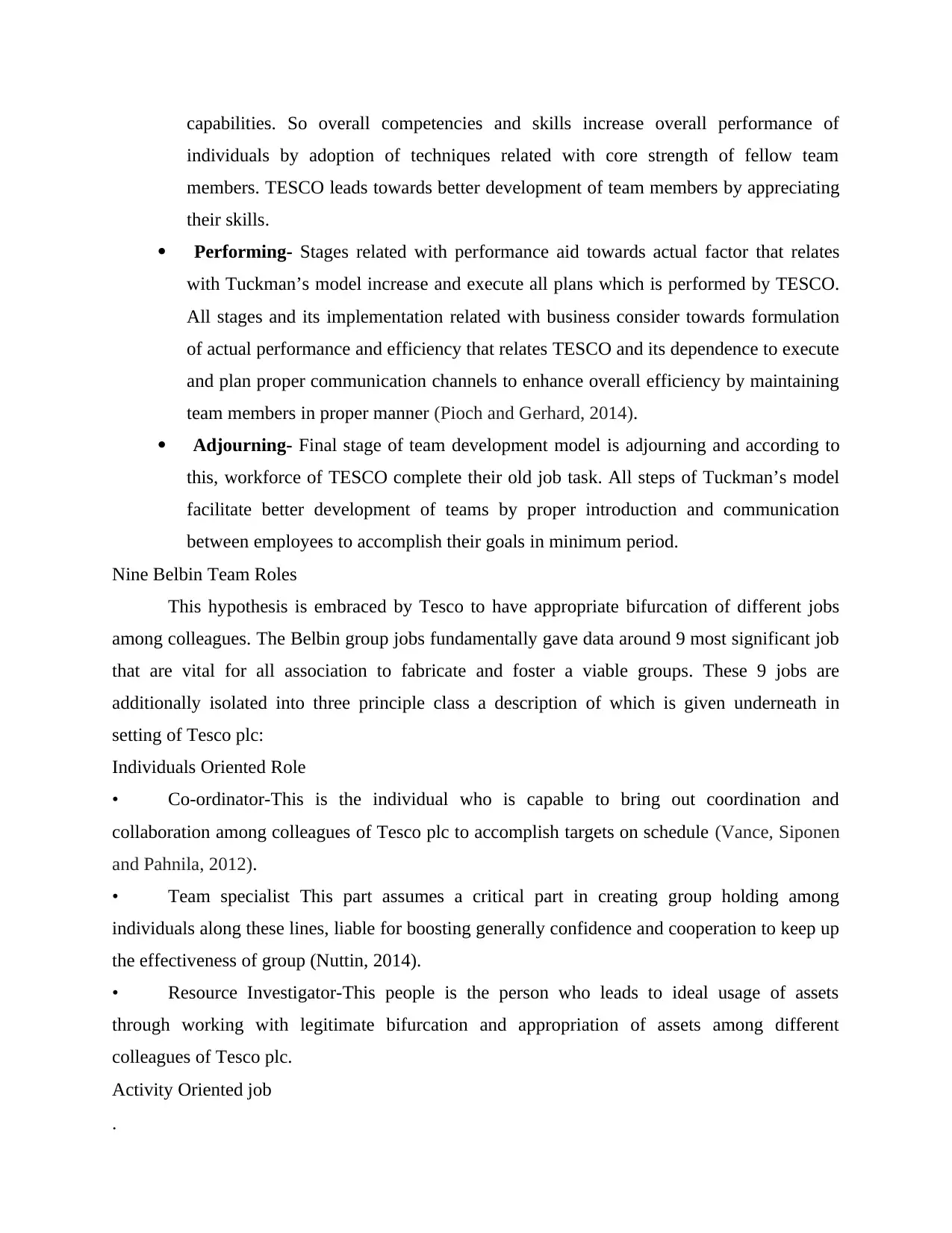
capabilities. So overall competencies and skills increase overall performance of
individuals by adoption of techniques related with core strength of fellow team
members. TESCO leads towards better development of team members by appreciating
their skills.
Performing- Stages related with performance aid towards actual factor that relates
with Tuckman’s model increase and execute all plans which is performed by TESCO.
All stages and its implementation related with business consider towards formulation
of actual performance and efficiency that relates TESCO and its dependence to execute
and plan proper communication channels to enhance overall efficiency by maintaining
team members in proper manner (Pioch and Gerhard, 2014).
Adjourning- Final stage of team development model is adjourning and according to
this, workforce of TESCO complete their old job task. All steps of Tuckman’s model
facilitate better development of teams by proper introduction and communication
between employees to accomplish their goals in minimum period.
Nine Belbin Team Roles
This hypothesis is embraced by Tesco to have appropriate bifurcation of different jobs
among colleagues. The Belbin group jobs fundamentally gave data around 9 most significant job
that are vital for all association to fabricate and foster a viable groups. These 9 jobs are
additionally isolated into three principle class a description of which is given underneath in
setting of Tesco plc:
Individuals Oriented Role
• Co-ordinator-This is the individual who is capable to bring out coordination and
collaboration among colleagues of Tesco plc to accomplish targets on schedule (Vance, Siponen
and Pahnila, 2012).
• Team specialist This part assumes a critical part in creating group holding among
individuals along these lines, liable for boosting generally confidence and cooperation to keep up
the effectiveness of group (Nuttin, 2014).
• Resource Investigator-This people is the person who leads to ideal usage of assets
through working with legitimate bifurcation and appropriation of assets among different
colleagues of Tesco plc.
Activity Oriented job
.
individuals by adoption of techniques related with core strength of fellow team
members. TESCO leads towards better development of team members by appreciating
their skills.
Performing- Stages related with performance aid towards actual factor that relates
with Tuckman’s model increase and execute all plans which is performed by TESCO.
All stages and its implementation related with business consider towards formulation
of actual performance and efficiency that relates TESCO and its dependence to execute
and plan proper communication channels to enhance overall efficiency by maintaining
team members in proper manner (Pioch and Gerhard, 2014).
Adjourning- Final stage of team development model is adjourning and according to
this, workforce of TESCO complete their old job task. All steps of Tuckman’s model
facilitate better development of teams by proper introduction and communication
between employees to accomplish their goals in minimum period.
Nine Belbin Team Roles
This hypothesis is embraced by Tesco to have appropriate bifurcation of different jobs
among colleagues. The Belbin group jobs fundamentally gave data around 9 most significant job
that are vital for all association to fabricate and foster a viable groups. These 9 jobs are
additionally isolated into three principle class a description of which is given underneath in
setting of Tesco plc:
Individuals Oriented Role
• Co-ordinator-This is the individual who is capable to bring out coordination and
collaboration among colleagues of Tesco plc to accomplish targets on schedule (Vance, Siponen
and Pahnila, 2012).
• Team specialist This part assumes a critical part in creating group holding among
individuals along these lines, liable for boosting generally confidence and cooperation to keep up
the effectiveness of group (Nuttin, 2014).
• Resource Investigator-This people is the person who leads to ideal usage of assets
through working with legitimate bifurcation and appropriation of assets among different
colleagues of Tesco plc.
Activity Oriented job
.
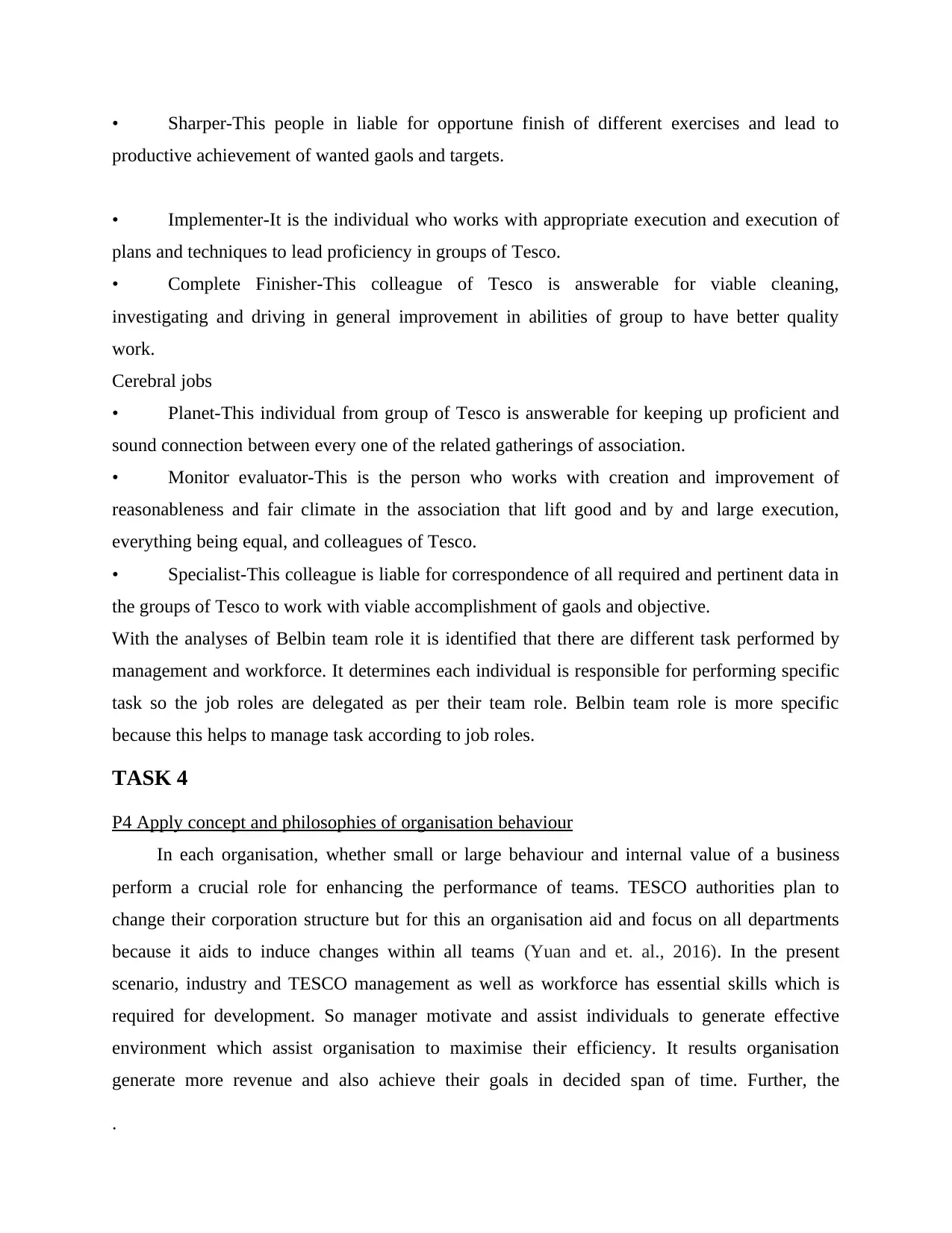
• Sharper-This people in liable for opportune finish of different exercises and lead to
productive achievement of wanted gaols and targets.
• Implementer-It is the individual who works with appropriate execution and execution of
plans and techniques to lead proficiency in groups of Tesco.
• Complete Finisher-This colleague of Tesco is answerable for viable cleaning,
investigating and driving in general improvement in abilities of group to have better quality
work.
Cerebral jobs
• Planet-This individual from group of Tesco is answerable for keeping up proficient and
sound connection between every one of the related gatherings of association.
• Monitor evaluator-This is the person who works with creation and improvement of
reasonableness and fair climate in the association that lift good and by and large execution,
everything being equal, and colleagues of Tesco.
• Specialist-This colleague is liable for correspondence of all required and pertinent data in
the groups of Tesco to work with viable accomplishment of gaols and objective.
With the analyses of Belbin team role it is identified that there are different task performed by
management and workforce. It determines each individual is responsible for performing specific
task so the job roles are delegated as per their team role. Belbin team role is more specific
because this helps to manage task according to job roles.
TASK 4
P4 Apply concept and philosophies of organisation behaviour
In each organisation, whether small or large behaviour and internal value of a business
perform a crucial role for enhancing the performance of teams. TESCO authorities plan to
change their corporation structure but for this an organisation aid and focus on all departments
because it aids to induce changes within all teams (Yuan and et. al., 2016). In the present
scenario, industry and TESCO management as well as workforce has essential skills which is
required for development. So manager motivate and assist individuals to generate effective
environment which assist organisation to maximise their efficiency. It results organisation
generate more revenue and also achieve their goals in decided span of time. Further, the
.
productive achievement of wanted gaols and targets.
• Implementer-It is the individual who works with appropriate execution and execution of
plans and techniques to lead proficiency in groups of Tesco.
• Complete Finisher-This colleague of Tesco is answerable for viable cleaning,
investigating and driving in general improvement in abilities of group to have better quality
work.
Cerebral jobs
• Planet-This individual from group of Tesco is answerable for keeping up proficient and
sound connection between every one of the related gatherings of association.
• Monitor evaluator-This is the person who works with creation and improvement of
reasonableness and fair climate in the association that lift good and by and large execution,
everything being equal, and colleagues of Tesco.
• Specialist-This colleague is liable for correspondence of all required and pertinent data in
the groups of Tesco to work with viable accomplishment of gaols and objective.
With the analyses of Belbin team role it is identified that there are different task performed by
management and workforce. It determines each individual is responsible for performing specific
task so the job roles are delegated as per their team role. Belbin team role is more specific
because this helps to manage task according to job roles.
TASK 4
P4 Apply concept and philosophies of organisation behaviour
In each organisation, whether small or large behaviour and internal value of a business
perform a crucial role for enhancing the performance of teams. TESCO authorities plan to
change their corporation structure but for this an organisation aid and focus on all departments
because it aids to induce changes within all teams (Yuan and et. al., 2016). In the present
scenario, industry and TESCO management as well as workforce has essential skills which is
required for development. So manager motivate and assist individuals to generate effective
environment which assist organisation to maximise their efficiency. It results organisation
generate more revenue and also achieve their goals in decided span of time. Further, the
.
Secure Best Marks with AI Grader
Need help grading? Try our AI Grader for instant feedback on your assignments.
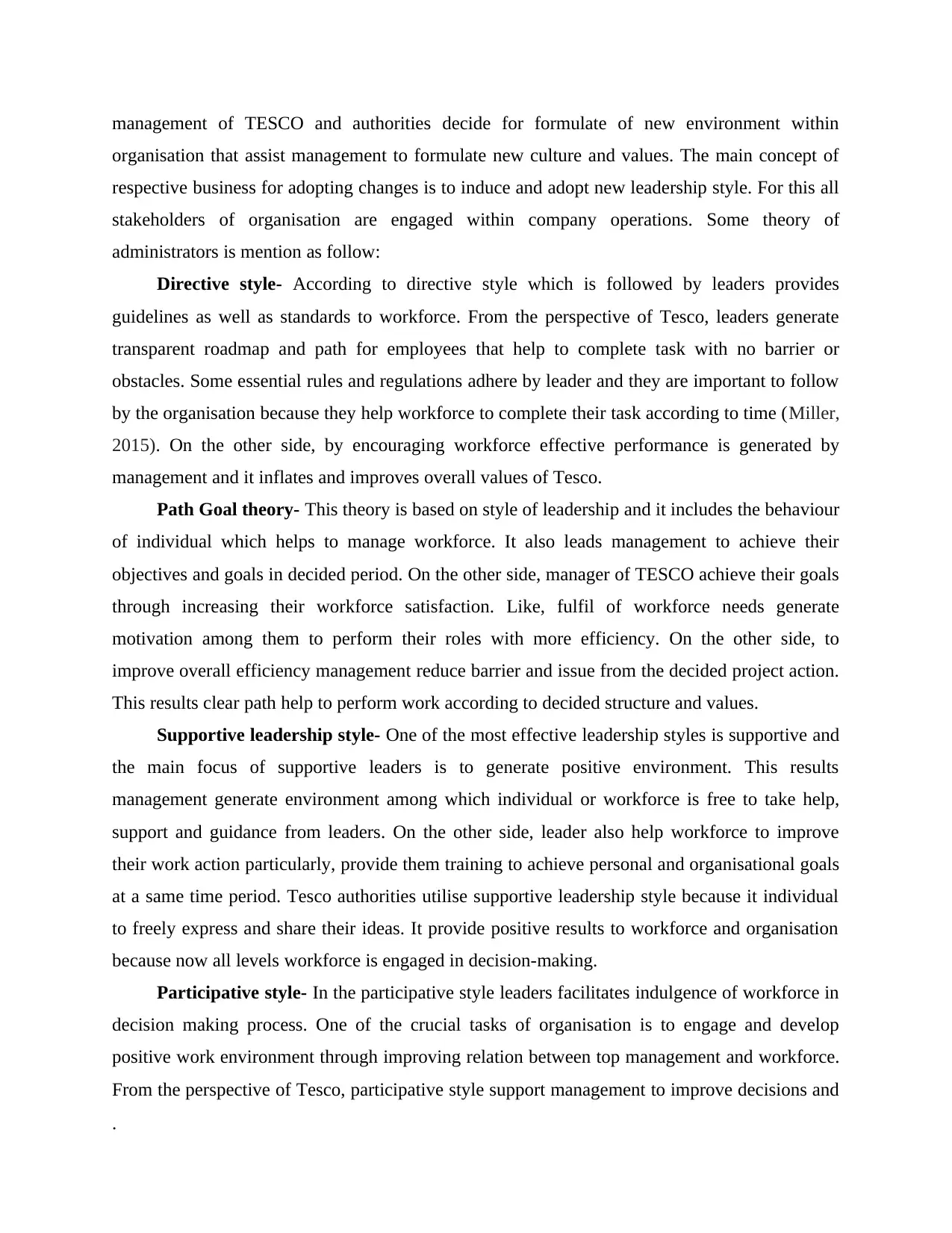
management of TESCO and authorities decide for formulate of new environment within
organisation that assist management to formulate new culture and values. The main concept of
respective business for adopting changes is to induce and adopt new leadership style. For this all
stakeholders of organisation are engaged within company operations. Some theory of
administrators is mention as follow:
Directive style- According to directive style which is followed by leaders provides
guidelines as well as standards to workforce. From the perspective of Tesco, leaders generate
transparent roadmap and path for employees that help to complete task with no barrier or
obstacles. Some essential rules and regulations adhere by leader and they are important to follow
by the organisation because they help workforce to complete their task according to time (Miller,
2015). On the other side, by encouraging workforce effective performance is generated by
management and it inflates and improves overall values of Tesco.
Path Goal theory- This theory is based on style of leadership and it includes the behaviour
of individual which helps to manage workforce. It also leads management to achieve their
objectives and goals in decided period. On the other side, manager of TESCO achieve their goals
through increasing their workforce satisfaction. Like, fulfil of workforce needs generate
motivation among them to perform their roles with more efficiency. On the other side, to
improve overall efficiency management reduce barrier and issue from the decided project action.
This results clear path help to perform work according to decided structure and values.
Supportive leadership style- One of the most effective leadership styles is supportive and
the main focus of supportive leaders is to generate positive environment. This results
management generate environment among which individual or workforce is free to take help,
support and guidance from leaders. On the other side, leader also help workforce to improve
their work action particularly, provide them training to achieve personal and organisational goals
at a same time period. Tesco authorities utilise supportive leadership style because it individual
to freely express and share their ideas. It provide positive results to workforce and organisation
because now all levels workforce is engaged in decision-making.
Participative style- In the participative style leaders facilitates indulgence of workforce in
decision making process. One of the crucial tasks of organisation is to engage and develop
positive work environment through improving relation between top management and workforce.
From the perspective of Tesco, participative style support management to improve decisions and
.
organisation that assist management to formulate new culture and values. The main concept of
respective business for adopting changes is to induce and adopt new leadership style. For this all
stakeholders of organisation are engaged within company operations. Some theory of
administrators is mention as follow:
Directive style- According to directive style which is followed by leaders provides
guidelines as well as standards to workforce. From the perspective of Tesco, leaders generate
transparent roadmap and path for employees that help to complete task with no barrier or
obstacles. Some essential rules and regulations adhere by leader and they are important to follow
by the organisation because they help workforce to complete their task according to time (Miller,
2015). On the other side, by encouraging workforce effective performance is generated by
management and it inflates and improves overall values of Tesco.
Path Goal theory- This theory is based on style of leadership and it includes the behaviour
of individual which helps to manage workforce. It also leads management to achieve their
objectives and goals in decided period. On the other side, manager of TESCO achieve their goals
through increasing their workforce satisfaction. Like, fulfil of workforce needs generate
motivation among them to perform their roles with more efficiency. On the other side, to
improve overall efficiency management reduce barrier and issue from the decided project action.
This results clear path help to perform work according to decided structure and values.
Supportive leadership style- One of the most effective leadership styles is supportive and
the main focus of supportive leaders is to generate positive environment. This results
management generate environment among which individual or workforce is free to take help,
support and guidance from leaders. On the other side, leader also help workforce to improve
their work action particularly, provide them training to achieve personal and organisational goals
at a same time period. Tesco authorities utilise supportive leadership style because it individual
to freely express and share their ideas. It provide positive results to workforce and organisation
because now all levels workforce is engaged in decision-making.
Participative style- In the participative style leaders facilitates indulgence of workforce in
decision making process. One of the crucial tasks of organisation is to engage and develop
positive work environment through improving relation between top management and workforce.
From the perspective of Tesco, participative style support management to improve decisions and
.
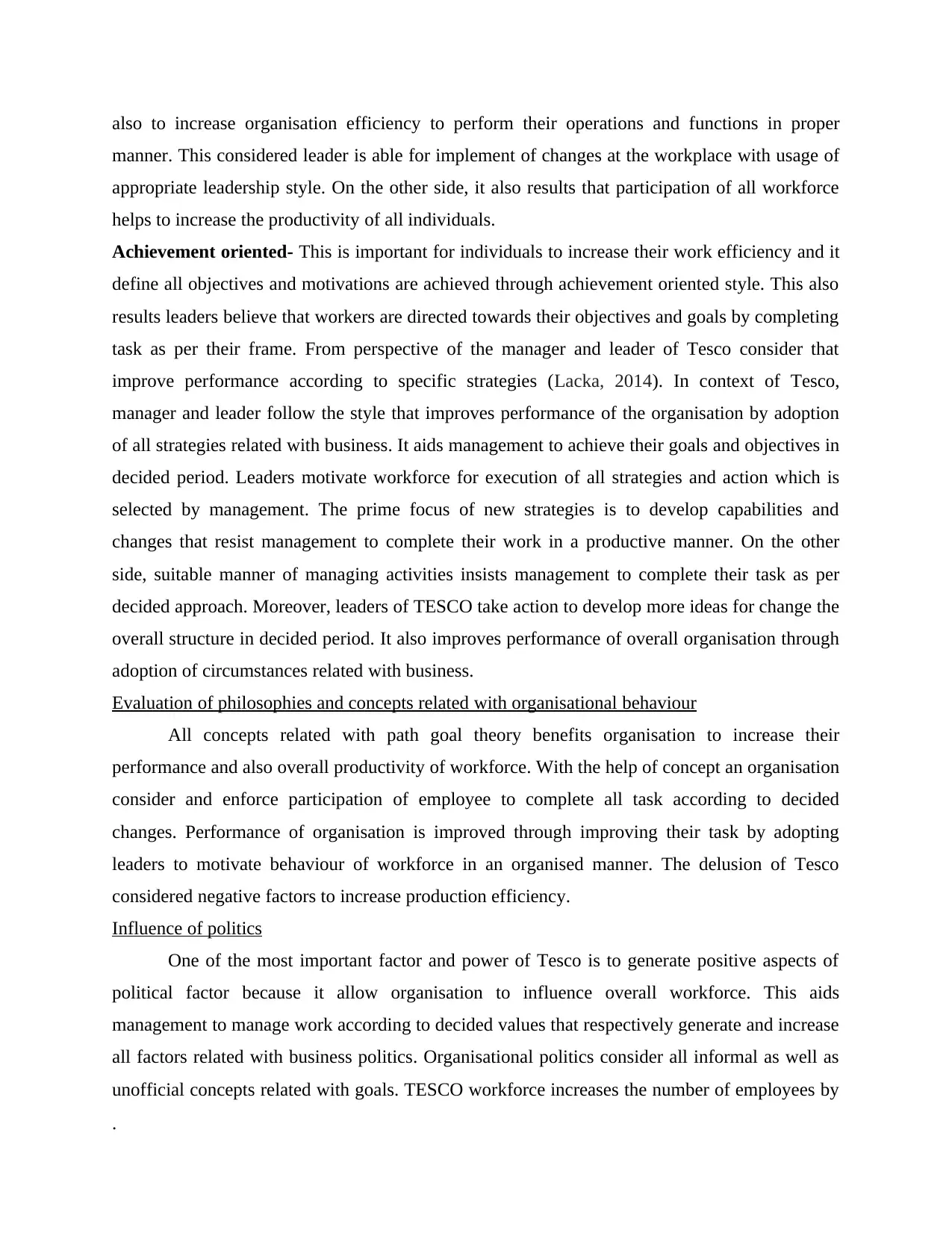
also to increase organisation efficiency to perform their operations and functions in proper
manner. This considered leader is able for implement of changes at the workplace with usage of
appropriate leadership style. On the other side, it also results that participation of all workforce
helps to increase the productivity of all individuals.
Achievement oriented- This is important for individuals to increase their work efficiency and it
define all objectives and motivations are achieved through achievement oriented style. This also
results leaders believe that workers are directed towards their objectives and goals by completing
task as per their frame. From perspective of the manager and leader of Tesco consider that
improve performance according to specific strategies (Lacka, 2014). In context of Tesco,
manager and leader follow the style that improves performance of the organisation by adoption
of all strategies related with business. It aids management to achieve their goals and objectives in
decided period. Leaders motivate workforce for execution of all strategies and action which is
selected by management. The prime focus of new strategies is to develop capabilities and
changes that resist management to complete their work in a productive manner. On the other
side, suitable manner of managing activities insists management to complete their task as per
decided approach. Moreover, leaders of TESCO take action to develop more ideas for change the
overall structure in decided period. It also improves performance of overall organisation through
adoption of circumstances related with business.
Evaluation of philosophies and concepts related with organisational behaviour
All concepts related with path goal theory benefits organisation to increase their
performance and also overall productivity of workforce. With the help of concept an organisation
consider and enforce participation of employee to complete all task according to decided
changes. Performance of organisation is improved through improving their task by adopting
leaders to motivate behaviour of workforce in an organised manner. The delusion of Tesco
considered negative factors to increase production efficiency.
Influence of politics
One of the most important factor and power of Tesco is to generate positive aspects of
political factor because it allow organisation to influence overall workforce. This aids
management to manage work according to decided values that respectively generate and increase
all factors related with business politics. Organisational politics consider all informal as well as
unofficial concepts related with goals. TESCO workforce increases the number of employees by
.
manner. This considered leader is able for implement of changes at the workplace with usage of
appropriate leadership style. On the other side, it also results that participation of all workforce
helps to increase the productivity of all individuals.
Achievement oriented- This is important for individuals to increase their work efficiency and it
define all objectives and motivations are achieved through achievement oriented style. This also
results leaders believe that workers are directed towards their objectives and goals by completing
task as per their frame. From perspective of the manager and leader of Tesco consider that
improve performance according to specific strategies (Lacka, 2014). In context of Tesco,
manager and leader follow the style that improves performance of the organisation by adoption
of all strategies related with business. It aids management to achieve their goals and objectives in
decided period. Leaders motivate workforce for execution of all strategies and action which is
selected by management. The prime focus of new strategies is to develop capabilities and
changes that resist management to complete their work in a productive manner. On the other
side, suitable manner of managing activities insists management to complete their task as per
decided approach. Moreover, leaders of TESCO take action to develop more ideas for change the
overall structure in decided period. It also improves performance of overall organisation through
adoption of circumstances related with business.
Evaluation of philosophies and concepts related with organisational behaviour
All concepts related with path goal theory benefits organisation to increase their
performance and also overall productivity of workforce. With the help of concept an organisation
consider and enforce participation of employee to complete all task according to decided
changes. Performance of organisation is improved through improving their task by adopting
leaders to motivate behaviour of workforce in an organised manner. The delusion of Tesco
considered negative factors to increase production efficiency.
Influence of politics
One of the most important factor and power of Tesco is to generate positive aspects of
political factor because it allow organisation to influence overall workforce. This aids
management to manage work according to decided values that respectively generate and increase
all factors related with business politics. Organisational politics consider all informal as well as
unofficial concepts related with goals. TESCO workforce increases the number of employees by
.
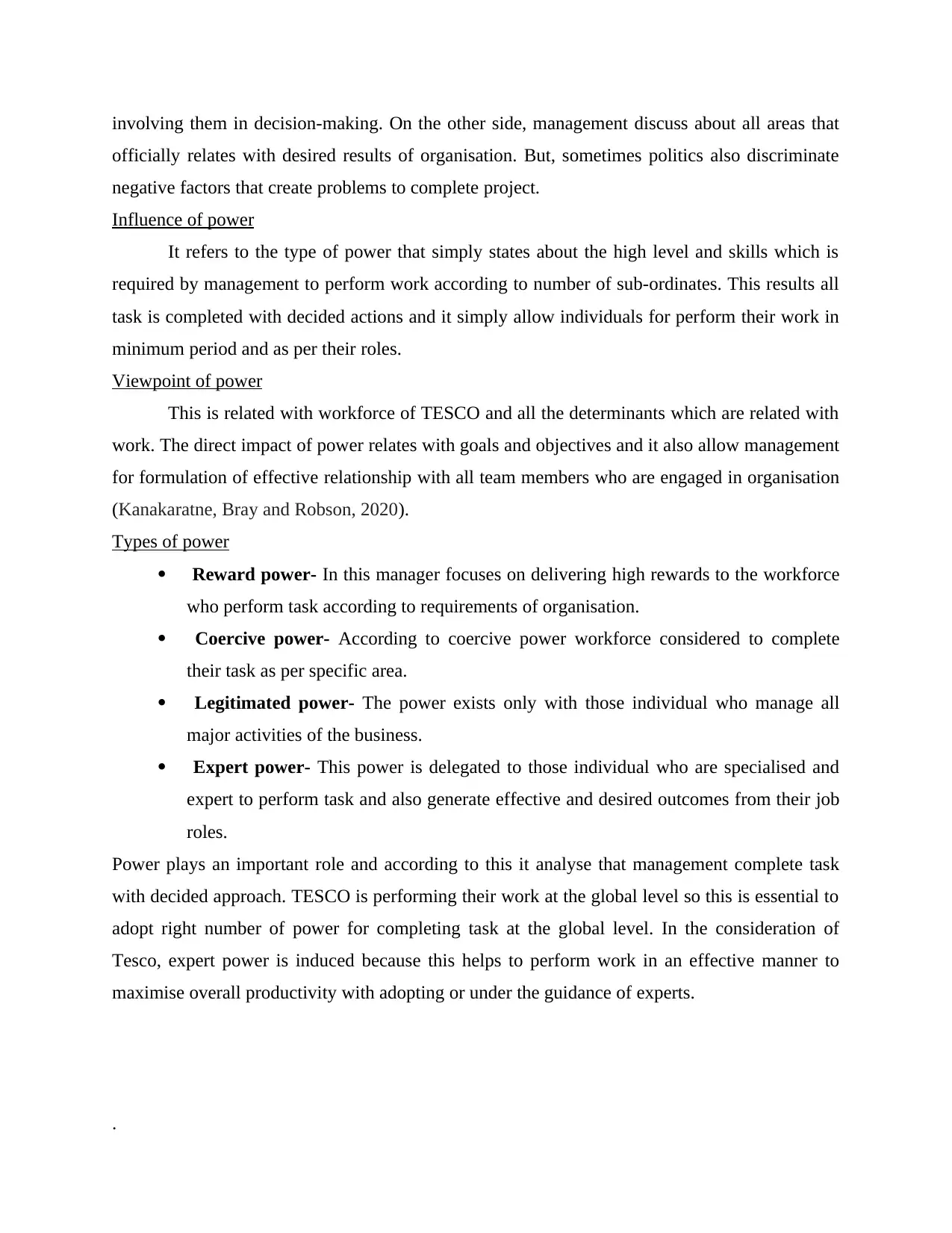
involving them in decision-making. On the other side, management discuss about all areas that
officially relates with desired results of organisation. But, sometimes politics also discriminate
negative factors that create problems to complete project.
Influence of power
It refers to the type of power that simply states about the high level and skills which is
required by management to perform work according to number of sub-ordinates. This results all
task is completed with decided actions and it simply allow individuals for perform their work in
minimum period and as per their roles.
Viewpoint of power
This is related with workforce of TESCO and all the determinants which are related with
work. The direct impact of power relates with goals and objectives and it also allow management
for formulation of effective relationship with all team members who are engaged in organisation
(Kanakaratne, Bray and Robson, 2020).
Types of power
Reward power- In this manager focuses on delivering high rewards to the workforce
who perform task according to requirements of organisation.
Coercive power- According to coercive power workforce considered to complete
their task as per specific area.
Legitimated power- The power exists only with those individual who manage all
major activities of the business.
Expert power- This power is delegated to those individual who are specialised and
expert to perform task and also generate effective and desired outcomes from their job
roles.
Power plays an important role and according to this it analyse that management complete task
with decided approach. TESCO is performing their work at the global level so this is essential to
adopt right number of power for completing task at the global level. In the consideration of
Tesco, expert power is induced because this helps to perform work in an effective manner to
maximise overall productivity with adopting or under the guidance of experts.
.
officially relates with desired results of organisation. But, sometimes politics also discriminate
negative factors that create problems to complete project.
Influence of power
It refers to the type of power that simply states about the high level and skills which is
required by management to perform work according to number of sub-ordinates. This results all
task is completed with decided actions and it simply allow individuals for perform their work in
minimum period and as per their roles.
Viewpoint of power
This is related with workforce of TESCO and all the determinants which are related with
work. The direct impact of power relates with goals and objectives and it also allow management
for formulation of effective relationship with all team members who are engaged in organisation
(Kanakaratne, Bray and Robson, 2020).
Types of power
Reward power- In this manager focuses on delivering high rewards to the workforce
who perform task according to requirements of organisation.
Coercive power- According to coercive power workforce considered to complete
their task as per specific area.
Legitimated power- The power exists only with those individual who manage all
major activities of the business.
Expert power- This power is delegated to those individual who are specialised and
expert to perform task and also generate effective and desired outcomes from their job
roles.
Power plays an important role and according to this it analyse that management complete task
with decided approach. TESCO is performing their work at the global level so this is essential to
adopt right number of power for completing task at the global level. In the consideration of
Tesco, expert power is induced because this helps to perform work in an effective manner to
maximise overall productivity with adopting or under the guidance of experts.
.
Paraphrase This Document
Need a fresh take? Get an instant paraphrase of this document with our AI Paraphraser
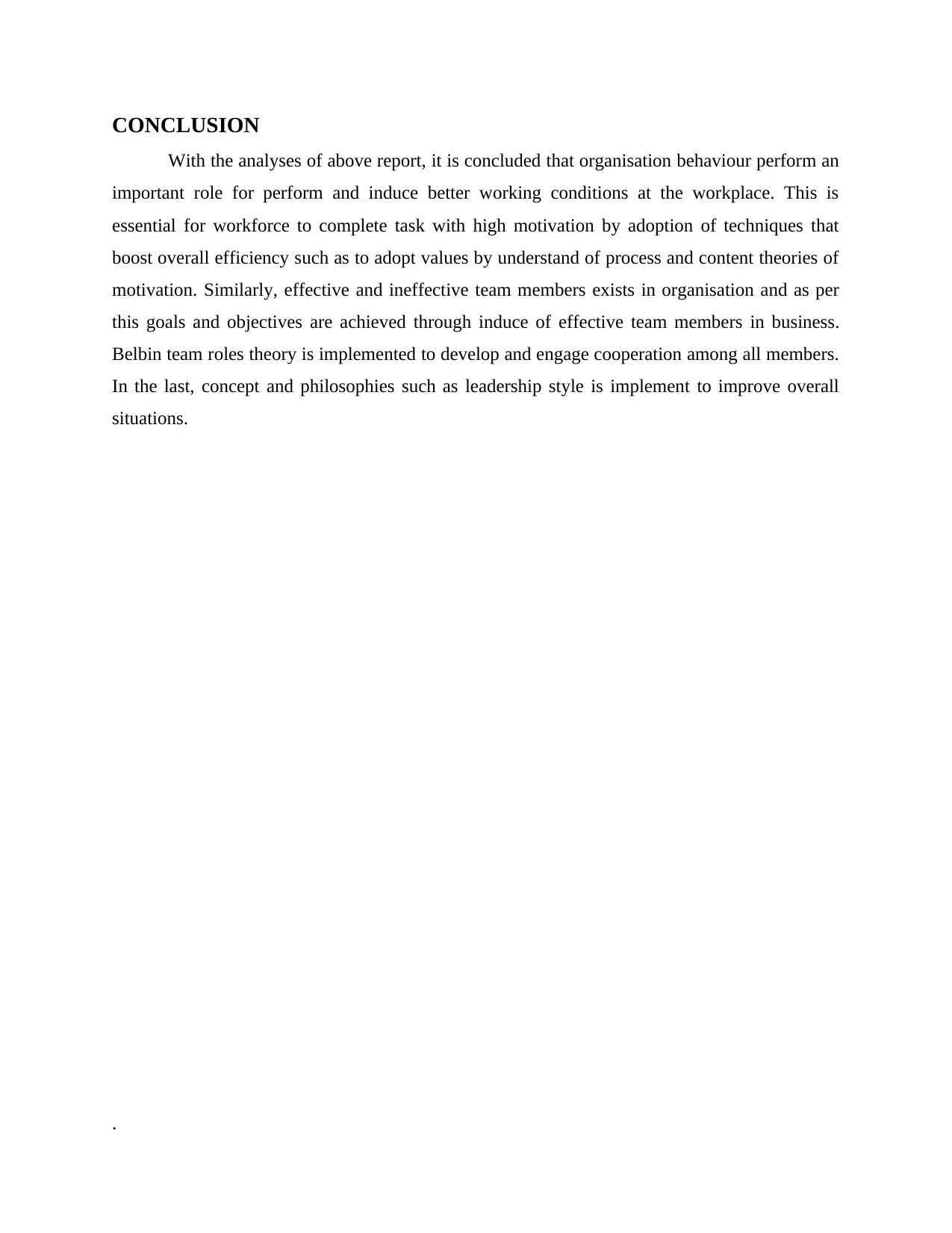
CONCLUSION
With the analyses of above report, it is concluded that organisation behaviour perform an
important role for perform and induce better working conditions at the workplace. This is
essential for workforce to complete task with high motivation by adoption of techniques that
boost overall efficiency such as to adopt values by understand of process and content theories of
motivation. Similarly, effective and ineffective team members exists in organisation and as per
this goals and objectives are achieved through induce of effective team members in business.
Belbin team roles theory is implemented to develop and engage cooperation among all members.
In the last, concept and philosophies such as leadership style is implement to improve overall
situations.
.
With the analyses of above report, it is concluded that organisation behaviour perform an
important role for perform and induce better working conditions at the workplace. This is
essential for workforce to complete task with high motivation by adoption of techniques that
boost overall efficiency such as to adopt values by understand of process and content theories of
motivation. Similarly, effective and ineffective team members exists in organisation and as per
this goals and objectives are achieved through induce of effective team members in business.
Belbin team roles theory is implemented to develop and engage cooperation among all members.
In the last, concept and philosophies such as leadership style is implement to improve overall
situations.
.
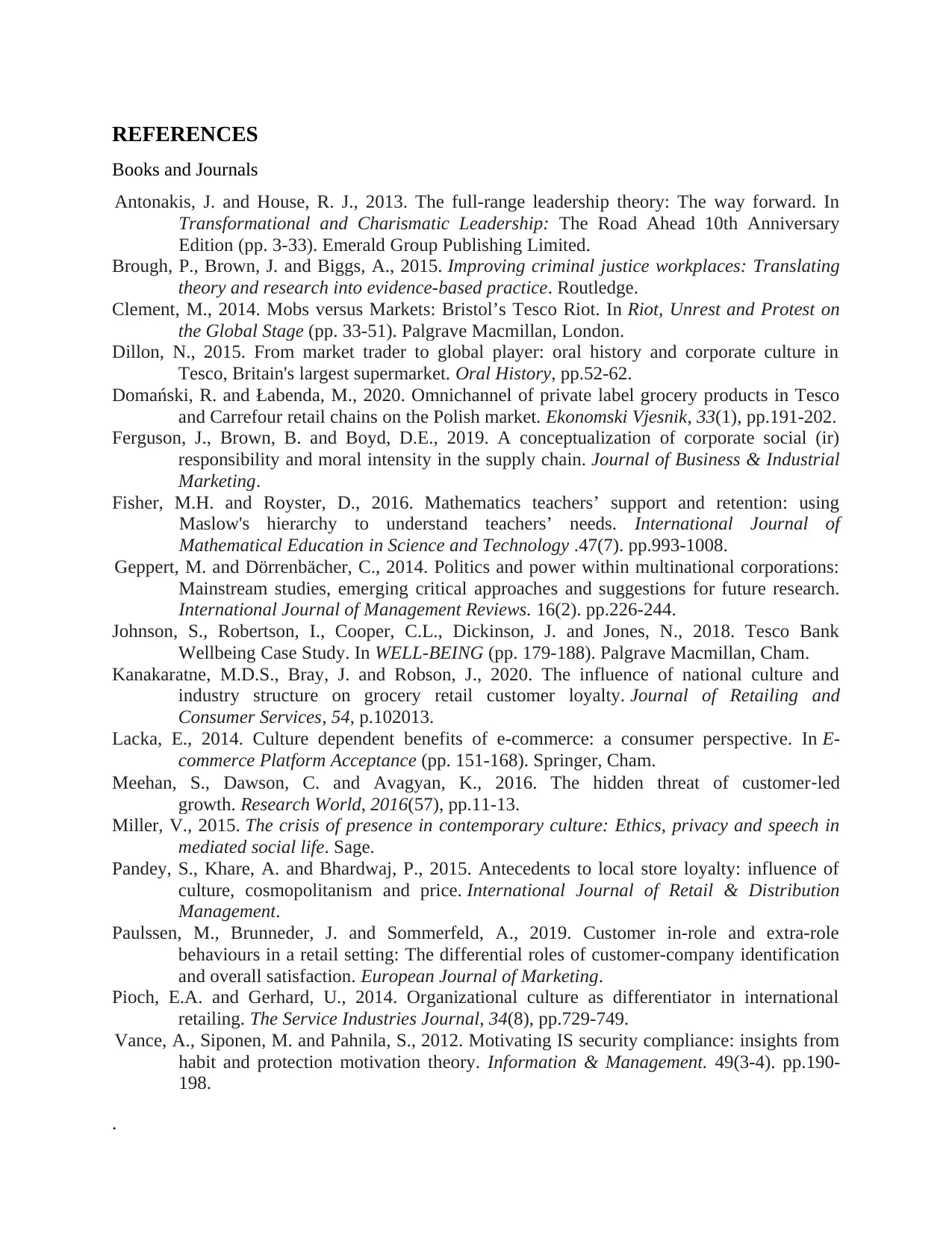
REFERENCES
Books and Journals
Antonakis, J. and House, R. J., 2013. The full-range leadership theory: The way forward. In
Transformational and Charismatic Leadership: The Road Ahead 10th Anniversary
Edition (pp. 3-33). Emerald Group Publishing Limited.
Brough, P., Brown, J. and Biggs, A., 2015. Improving criminal justice workplaces: Translating
theory and research into evidence-based practice. Routledge.
Clement, M., 2014. Mobs versus Markets: Bristol’s Tesco Riot. In Riot, Unrest and Protest on
the Global Stage (pp. 33-51). Palgrave Macmillan, London.
Dillon, N., 2015. From market trader to global player: oral history and corporate culture in
Tesco, Britain's largest supermarket. Oral History, pp.52-62.
Domański, R. and Łabenda, M., 2020. Omnichannel of private label grocery products in Tesco
and Carrefour retail chains on the Polish market. Ekonomski Vjesnik, 33(1), pp.191-202.
Ferguson, J., Brown, B. and Boyd, D.E., 2019. A conceptualization of corporate social (ir)
responsibility and moral intensity in the supply chain. Journal of Business & Industrial
Marketing.
Fisher, M.H. and Royster, D., 2016. Mathematics teachers’ support and retention: using
Maslow's hierarchy to understand teachers’ needs. International Journal of
Mathematical Education in Science and Technology .47(7). pp.993-1008.
Geppert, M. and Dörrenbächer, C., 2014. Politics and power within multinational corporations:
Mainstream studies, emerging critical approaches and suggestions for future research.
International Journal of Management Reviews. 16(2). pp.226-244.
Johnson, S., Robertson, I., Cooper, C.L., Dickinson, J. and Jones, N., 2018. Tesco Bank
Wellbeing Case Study. In WELL-BEING (pp. 179-188). Palgrave Macmillan, Cham.
Kanakaratne, M.D.S., Bray, J. and Robson, J., 2020. The influence of national culture and
industry structure on grocery retail customer loyalty. Journal of Retailing and
Consumer Services, 54, p.102013.
Lacka, E., 2014. Culture dependent benefits of e-commerce: a consumer perspective. In E-
commerce Platform Acceptance (pp. 151-168). Springer, Cham.
Meehan, S., Dawson, C. and Avagyan, K., 2016. The hidden threat of customer‐led
growth. Research World, 2016(57), pp.11-13.
Miller, V., 2015. The crisis of presence in contemporary culture: Ethics, privacy and speech in
mediated social life. Sage.
Pandey, S., Khare, A. and Bhardwaj, P., 2015. Antecedents to local store loyalty: influence of
culture, cosmopolitanism and price. International Journal of Retail & Distribution
Management.
Paulssen, M., Brunneder, J. and Sommerfeld, A., 2019. Customer in-role and extra-role
behaviours in a retail setting: The differential roles of customer-company identification
and overall satisfaction. European Journal of Marketing.
Pioch, E.A. and Gerhard, U., 2014. Organizational culture as differentiator in international
retailing. The Service Industries Journal, 34(8), pp.729-749.
Vance, A., Siponen, M. and Pahnila, S., 2012. Motivating IS security compliance: insights from
habit and protection motivation theory. Information & Management. 49(3-4). pp.190-
198.
.
Books and Journals
Antonakis, J. and House, R. J., 2013. The full-range leadership theory: The way forward. In
Transformational and Charismatic Leadership: The Road Ahead 10th Anniversary
Edition (pp. 3-33). Emerald Group Publishing Limited.
Brough, P., Brown, J. and Biggs, A., 2015. Improving criminal justice workplaces: Translating
theory and research into evidence-based practice. Routledge.
Clement, M., 2014. Mobs versus Markets: Bristol’s Tesco Riot. In Riot, Unrest and Protest on
the Global Stage (pp. 33-51). Palgrave Macmillan, London.
Dillon, N., 2015. From market trader to global player: oral history and corporate culture in
Tesco, Britain's largest supermarket. Oral History, pp.52-62.
Domański, R. and Łabenda, M., 2020. Omnichannel of private label grocery products in Tesco
and Carrefour retail chains on the Polish market. Ekonomski Vjesnik, 33(1), pp.191-202.
Ferguson, J., Brown, B. and Boyd, D.E., 2019. A conceptualization of corporate social (ir)
responsibility and moral intensity in the supply chain. Journal of Business & Industrial
Marketing.
Fisher, M.H. and Royster, D., 2016. Mathematics teachers’ support and retention: using
Maslow's hierarchy to understand teachers’ needs. International Journal of
Mathematical Education in Science and Technology .47(7). pp.993-1008.
Geppert, M. and Dörrenbächer, C., 2014. Politics and power within multinational corporations:
Mainstream studies, emerging critical approaches and suggestions for future research.
International Journal of Management Reviews. 16(2). pp.226-244.
Johnson, S., Robertson, I., Cooper, C.L., Dickinson, J. and Jones, N., 2018. Tesco Bank
Wellbeing Case Study. In WELL-BEING (pp. 179-188). Palgrave Macmillan, Cham.
Kanakaratne, M.D.S., Bray, J. and Robson, J., 2020. The influence of national culture and
industry structure on grocery retail customer loyalty. Journal of Retailing and
Consumer Services, 54, p.102013.
Lacka, E., 2014. Culture dependent benefits of e-commerce: a consumer perspective. In E-
commerce Platform Acceptance (pp. 151-168). Springer, Cham.
Meehan, S., Dawson, C. and Avagyan, K., 2016. The hidden threat of customer‐led
growth. Research World, 2016(57), pp.11-13.
Miller, V., 2015. The crisis of presence in contemporary culture: Ethics, privacy and speech in
mediated social life. Sage.
Pandey, S., Khare, A. and Bhardwaj, P., 2015. Antecedents to local store loyalty: influence of
culture, cosmopolitanism and price. International Journal of Retail & Distribution
Management.
Paulssen, M., Brunneder, J. and Sommerfeld, A., 2019. Customer in-role and extra-role
behaviours in a retail setting: The differential roles of customer-company identification
and overall satisfaction. European Journal of Marketing.
Pioch, E.A. and Gerhard, U., 2014. Organizational culture as differentiator in international
retailing. The Service Industries Journal, 34(8), pp.729-749.
Vance, A., Siponen, M. and Pahnila, S., 2012. Motivating IS security compliance: insights from
habit and protection motivation theory. Information & Management. 49(3-4). pp.190-
198.
.
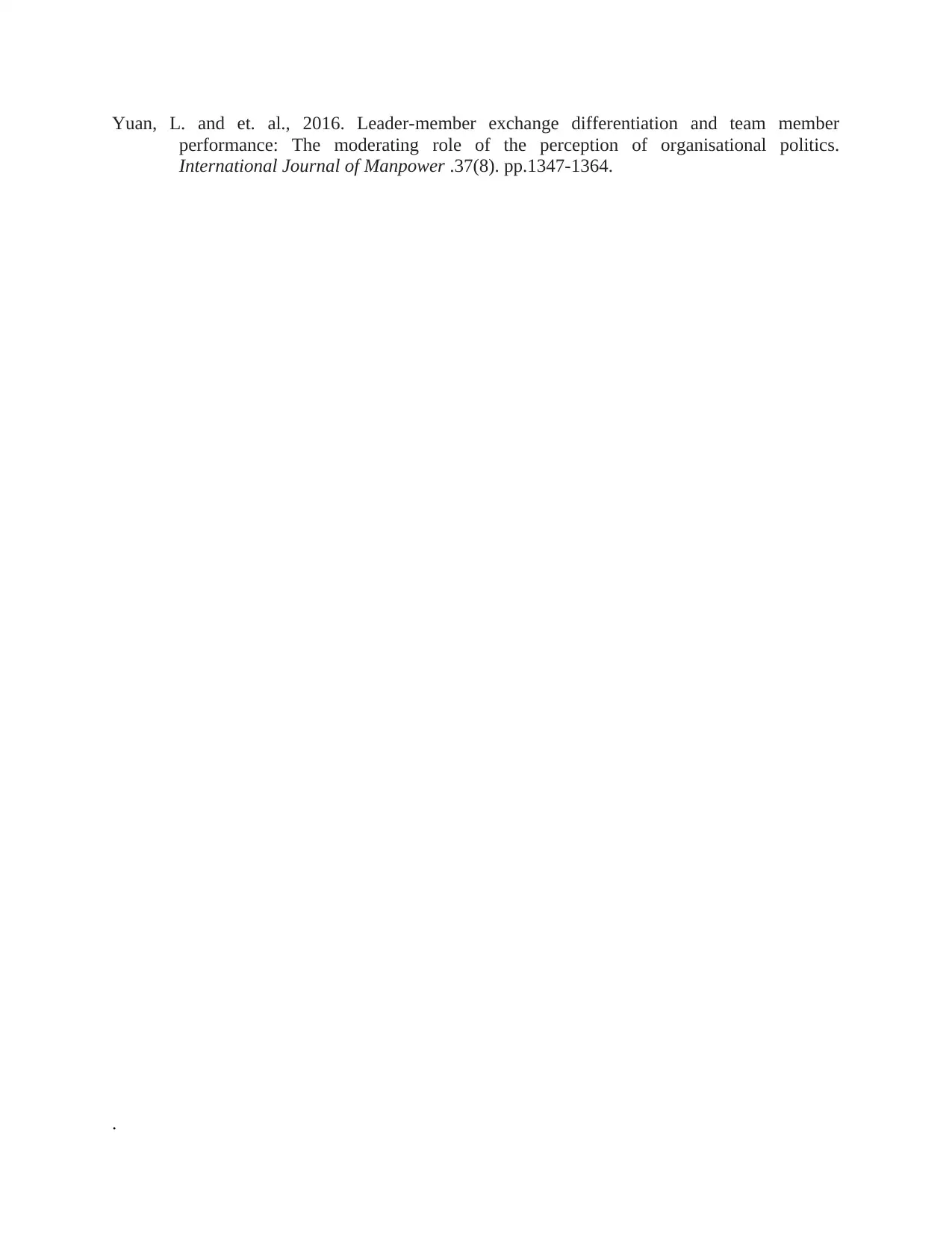
Yuan, L. and et. al., 2016. Leader-member exchange differentiation and team member
performance: The moderating role of the perception of organisational politics.
International Journal of Manpower .37(8). pp.1347-1364.
.
performance: The moderating role of the perception of organisational politics.
International Journal of Manpower .37(8). pp.1347-1364.
.
Secure Best Marks with AI Grader
Need help grading? Try our AI Grader for instant feedback on your assignments.

.
1 out of 17
Related Documents
Your All-in-One AI-Powered Toolkit for Academic Success.
+13062052269
info@desklib.com
Available 24*7 on WhatsApp / Email
![[object Object]](/_next/static/media/star-bottom.7253800d.svg)
Unlock your academic potential
© 2024 | Zucol Services PVT LTD | All rights reserved.




